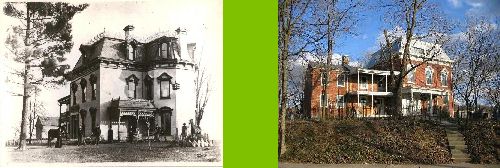More good advice from the 1909 book of Household Discoveries.
A recipe for stove polish but first some advice;
Before polishing the stove rub lard under the finger nails
Stove Blacking.- Dissolve 1/2 ounce of alum in 1 gill of soft water. Add 6 1/2 pounds of plumbago mixed with 12 ounces of lampblack. Stir vigourously. Stir in 1 1/2 gills of molasses, next 1/2 bar of white soap dissolved in 3 pints of water, and lastly 1 ounce of glycerine. This is a commercial article which has a great reputation.
Or beat up the whites of 3 eggs and mix in 1/2 pound of black lead. Dilute with sour beer or ale to the consistency of cream and boil gently for 15 or 20 minutes.
Or mix 8 ounces of copperas, 4 ounces of bone black and 4 ounces of black lead with water to the consistency of cream.
Or melt 1 pound of hard yellow soap with a little water and while hot stir in 1 pound of powdered soft coal. Cool, and preserve in tight fruit jars or wide mouthed bottles for use.
Or mix 4 ounces of black lead with 2 tablespoons of vinegar, 1 teaspoonful of sugar, and a piece of yellow soap the size of a butternut. Melt the soap with gentle heat and reduce while hot to the consistency of cream with coffee strained through a cheese cloth. Stir in 1/2 teaspoonful of alum.
Or use vinegar instead of water for mixing any of the above. The work of polishing will not be so hard and the polish will last longer.
Or mix with oil of turpentine. This prevents and removes rust.
Or add a little sugar or alum to any of the above; or a little benzine or naptha to help cut the grease. If these are added the stove must be polished cold.
Failure to observe that last bit of advice could result in some interesting consequences.
Now that you are completely confused, plumbago is graphite. A gill is 1/4 of a pint. There is no such thing as sour beer in this house and who in their right mind has EVER strained coffee and cream through a cheese cloth?

6 comments:
Geez. Sounds more like some concoction a witch would use. I especially like the lead in everything.
Oh yeah. Butternut. That's a squash right?
Actually a "Butternut" is a souari nut and is sort of like a walnut. Our southern readers would be more familiar with them. I suspect the author of the recipe was a southerner getting their recipe in a national publication as retaliation for the Civil War.
See, all this panic in the last 30 years about lead based products. Lead has been used for centuries and the human race has survived! I don't know anyone who goes around licking stoves and besides the twitches and the head jerks, lead hasn't affected me much!
There seem to be hang of a lot of ways to make stove polish. Obv. not too much to do back in 1909. "I know, Muriel, why don't we try 2 cups of water, one crushed acorn and a boiled egg this time?".
"...1 ounce of glycerine. This is a commercial article which has a great reputation". Love it.
We mostly ignore the fearmongering about lead poisoning. My father in law worked as a printer for over 50 yrs, many spent inhaling hot lead fumes & handling lead type. He rarely missed work & lived to be 84. As a boy, my husband molded toy soldiers from lead melted in a coffee can. Of course that could explain why his memory isn't so great! :-)
These comments gave my husband and me quite a laugh!!! Oh, you silly Yankees! : D
The dictionary defines black lead as "graphite" as in the pencil variety. Here is the link: http://chemistry.about.com/od/chemistryglossary/g/Black-Lead-Definition.htm
Post a Comment